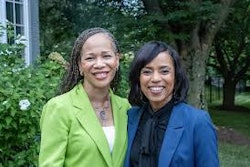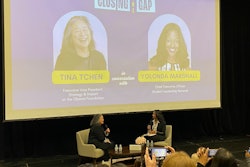Have you ever had that moment when you were in a meeting and proposed an idea for consideration to solve a problem? In an instance, you are abruptly interrupted. Your colleague regurgitated your idea as if it was their own. As you look around the table for a connection of affirmation, in your head you are thinking, “I just said that!” Yet, no one seems to notice except for you, and your colleague was credited and praised for the idea.
When these moments happen they are usually gendered and/or racialized. Let me set the context.
Recently, I went to the National Association of Student Affairs Practitioners (NASPA) in Los Angeles, California. For me, conferences serve as a place to not only discuss academic or practitioner work, but they are spaces to engage in affirmations among my most closest colleagues.
 Dr. Nichole Margarita Garcia
Dr. Nichole Margarita GarciaI went to lunch with one of my Chingona sisters, Dr. Marissa Vasquez, and her students. We were celebrating the Outstanding Faculty award that she received from NASPA. In more than one way, Dr. Vasquez serves as a mentor to myself and many other Latinas in academia. As we gathered to congratulate her accomplishments, we also exchanged stories.
One of the many stories we joked about was how often we experience the “moment” I opened this article with. However, what I did not say was that the make-up of the room is usually majority men (both White and of color) who interact and engage in “mansplaining.” Dr. Vasquez, stated, you need to write on this and name it, “I Just Said That!”
Rebecca Solnit, a journalist and editor, first coined “mansplaining,” in a commentary on how conversations are gendered and men often interrupt, cut off and explain things to women. This can manifest itself in various ways depending on the space, place and time. Since then, Solnit, has published the book Men Explain Things to Me which is a collection of essays exploring how mansplaining gets played out in different contexts. Academia is not void of mansplaining, however, there are ways to counteract it.
Black feminist, bell hooks, states: “I write these words to bear witness to the primacy of resistance struggle in any situation of domination (even within family life); to the strength and power that emerges from sustained resistance and the profound conviction that forces can be healing, can protects us from dehumanization and despair.”
This piece is the first act of resistance, and those that read this are my witnesses. As a Latina professor, being proactive when mansplaining appears is a way to talk back. This is how to talk back!
If you self-identify as a man and engage in mansplaining, whether you realize it or not, it is always important to make space for your self-identified female colleagues. Stepping back so others can step forward is very important in any setting where power dynamics are imbalanced. This also requires active listening and seeing. Active listening means that when feedback is provided you do not jump to reactionary statements, but rather take in and process it. Active seeing means being aware of non-verbal cues of your female colleagues, sometimes it is hard to mask how we feel. Cues can manifest them in ways such as looking down, eye-rolling, deep breaths or nostril flares. Take this into account, and do something to disrupt it when you recognize it. Statements such as, “you cut Dr.___off when she was speaking, what were you saying Dr.___?”
For those of us that are recipients of mansplaining, find an ally in spaces where you feel you need it most. Sometimes this can be students, staff, colleagues or partners. When mansplaining occurs and it is recognized this ally can often state, “As Dr.___ said, this idea is great.” This helps provide credit, where credit is due. This also helps us maintain our sanity and to avoid burnout. Knowing when to choose your battles to sustain our own emotional and mental well-being is of the essence.
Lastly, the spaces outside the ivory tower serve as some of the most intimate for these stories to be shared, heard, and witnessed to heal. I am so thankful for my Chingona sister-scholars network. I am not alone in my experiences. As Dr. Claudia Louis-Garcia, an assistant professor in education at the University of San Antonio, said to me “at times these are stories of pain and betrayal.” I would add, that knowing who to go to when things such as mansplaining do happen is our most intimate act of resistance.
Dr. Nichole Margarita Garcia is an assistant professor of higher education at Rutgers University, New Brunswick. You can follow her on Twitter @DrNicholeGarcia
















